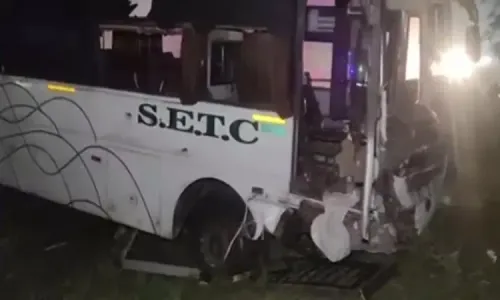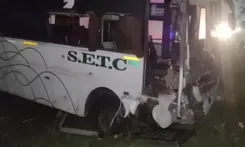How Did SSB Stop a Human Trafficking Ring in Bengal?

Synopsis
Key Takeaways
- SSB successfully intercepted a trafficking attempt.
- Seven Nepali women rescued, including a minor.
- Traffickers promised jobs abroad to lure victims.
- Ongoing investigations into a larger trafficking network.
- Importance of vigilance at border areas.
Kolkata, Aug 2 (NationPress) A recent human trafficking attempt in northern West Bengal has been successfully thwarted by the Sashastra Seema Bal (SSB) personnel. On Saturday, an operation was executed against a trafficking ring in the Panitanki Bazaar area, located near the India-Nepal border in the Kharibari block, close to Siliguri in northern Bengal.
The quick response team (QRT) from 'C' Company of the 41st Battalion of the SSB intercepted a vehicle from Panitanki Bazaar, positioned just 150 meters inside the India-Nepal border. This led to the arrest of two alleged traffickers and the rescue of seven young women from Nepal, including a minor.
Darjeeling Superintendent of Police Praveen Prakash informed the media that the rescued individuals were safely handed over to the police along with the two apprehended traffickers.
“The suspects will be presented before the Siliguri Subdistrict Court later today. Investigations are ongoing to determine if there are additional accomplices involved in this case,” Prakash stated.
The arrested individuals have been identified as Japan Gurung, a resident of Nepal, and Dipesh Gurung, from Toribari in the Darjeeling district of West Bengal.
Initial inquiries revealed that an organized international human trafficking network was orchestrating this operation.
“They entice Nepali girls and minors with promises of jobs abroad while preparing various identity documents like AADHAAR cards, PAN cards, and passports. Subsequently, these individuals are trafficked to foreign nations,” a district police officer explained.
It was discovered that Japan Gurung, alias Dada, was in contact with the families of the girls, assuring them of employment opportunities in Hong Kong.
“He solicited around one lakh Nepali rupees in advance from each family. Additionally, numerous photographs, videos, and counterfeit documents of young women were located on his mobile device,” the police official added.
In the previous month, nearly 90 young women from various districts in northern West Bengal were rescued by law enforcement in two separate operations.
Initially, the General Railways Police (GRP) saved 56 young women from the Terai-Dooars region during a raid on the Capital Express at New Jalpaiguri station.
A week later, the Pradhannagar police station of the Siliguri Police Commissionerate conducted another raid at the Sevak Road bus terminus in Siliguri, rescuing 34 women who were on the verge of being trafficked to other states.
These women were misled with promises of jobs in a mobile company in Bengaluru, but police later uncovered that the traffickers intended to transport them to Tamil Nadu.










